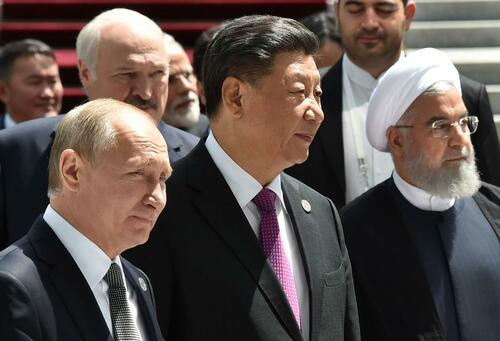Escobar: Made in China 2025 – Revisited
Escobar: Made in China 2025 – Revisited
Authored by Pepe Escobar,
The Two Sessions, part of the Chinese People’s Political Consultative Conference, held last week at the Great Hall of the People in Beijing, were a pretty serious deal.
Not only because the sessions set the framework for Beijing to confront serious economic challenges ahead.
But also because of the stellar performance by Foreign Minister Wang Yi, who forcefully imprinted in the collective psyche of the Global Majority how China should be regarded as a premier source of stability in this extremely turbulent geopolitical juncture, standing firm “in the right side of History”.
So let’s start with the key Wang Yi takeaways – which translate as de facto setting the tone for Beijing’s diplomacy throughout 2025.
US-China: Beijing is ready to engage with Trump 2.0 on the basis of mutual respect. Yet “if the US continues to contain China, we will resolutely counteract.” It’s “fully possible” for US and China to become partners. But this should be seen as the paramount concept: “No country should fantasize that it can suppress China and maintain good relations with us at the same time.”
The Global South: That is a “key force for maintaining world peace, driving world development and improving global governance”. These developing nations, accounting for over 40 per cent of global GDP, “hold the key to bringing stability to the world and making it a better place.” Wang Yi emphasized once again how China is “a natural member of the Global South.”
Russia – and Ukraine conflict: Russia and China’s“mature and resilient relationship (…) will not be swayed by any turn of events or be affected by any third party.” Wang Yi defined Beijing’s position on the conflict as “objective and impartial” – and crucially did not call for Europe – or Ukraine – to be included in the upcoming US-Russia negotiations. His major point – which echoes Russia’s analysis: “Security is mutual and equal; the security of one country cannot be built on the insecurity of others.”
Gaza: No Chinese endorsement of the Trump Gaza Riviera Resort and Casino gambit: “Gaza belongs to the Palestinian people”. And “changing its status by forceful means will not bring peace but new chaos”. Beijing supports the Egyptian peace plan. Once again, Wang Yi made it clear that “the crux of the cycle of the Palestinian-Israeli conflict lies in the fact that the two-state solution is only half achieved.”
Europe: Wang Yi praised the “capacity and wisdom” of EU-China to “deepen strategic dialogue and mutual trust.”Beijing, at least in theory, believes that Europe could become a trusted partner. The EU and the European Commission (EC) in Brussels may have other – belligerent – ideas.
South China Sea: Wang Yi went straight to the point on the manipulation of Philippines by “external forces”: “Infringement and provocation will backfire, and those acting as others’ chess pieces are bound to be discarded.” Yet he stressed the South China Sea remains “stable”, because China and ASEAN want it to remain so.
Taiwan: Wang Yi forcefully stated that “Taiwan has…




 HYPOCRISY alert
HYPOCRISY alert  pic.twitter.com/E22k41eP3U
pic.twitter.com/E22k41eP3U (@TiceRichard) November 29, 2023
(@TiceRichard) November 29, 2023





